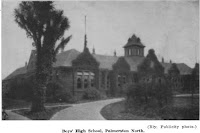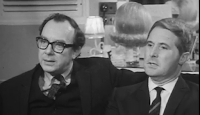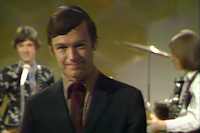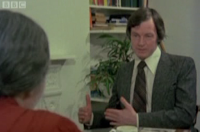'BBC presenter Michael Dean, who interviewed Grace Kelly and Morecambe & Wise on his 1960s TV show Late Night Line-Up, has died aged 82. But he did not go gently into the night. Two years ago, the former amateur boxing champ landed a few good punches on a thug who robbed him at a London cash machine. "I hadn’t hit anyone in about 50 years," Michael said. "I threw my cap at him and hit him with a left hook and right cross."'
What you possible didn't know about Michael, that he :
* was born in Palmerston North, New Zealand in 1933, the son of Mavis from the family behind the successful 'Carter Holt Harvey Timber Company' and Kendrick , a remarkable GP who travelled abroad to seek out treatments for the ailments of his local community and at the age of 8 started to a attend Quaker prep school in Whanganui, where he began to absorb the values of tolerance and hatred of injustice about which he would later become eloquent.
 * at the age of 11 joined Palmerston North Boys' School and after leaving at the age of 18 in 1951, became a journalist cadet on the local newspaper, then at the age of 20, contracted TB and confined to a sanatorium, began to read intensively, discovered the joy of books and ideas, Shakespeare and T,S.Eliot, who he called "big Tom” and once recovered, refined his skill in the boxing ring.
* at the age of 11 joined Palmerston North Boys' School and after leaving at the age of 18 in 1951, became a journalist cadet on the local newspaper, then at the age of 20, contracted TB and confined to a sanatorium, began to read intensively, discovered the joy of books and ideas, Shakespeare and T,S.Eliot, who he called "big Tom” and once recovered, refined his skill in the boxing ring.
* spent a year as a sports reporter for a Cape Town newspaper in South Africa, before returning to New Zealand to join National Radio, married his first wife, Shirley and moved to Sydney, Australia, then after three years, with his marriage at an end, brought his charm, good looks and journalistic experience to Britain in the grip of the 'Swinging Sixties' and by the mid-60s was a recognised face on 'Late Night Line-Up having joined Denis Tuohy and Joan Bakewell at the BBC on the team at the age of 31 in 1964.
* saw the programme go well beyond its initial remit of 'examining BBC2's output' to incorporate interviews, live music and poetry performances and discussions of other TV channels and current affairs issues and produce an astonishing 364 programmes a year over eight years with interviews of figures mainly, but not exclusively, from the stage and screen between 1964 and '72
The surviving record of these programmes, because they went out live and tapes were wiped, is scanty.

* made a 1965 interview with Peter Sellers : https://www.youtube.com/watch?v=jYYGO29u870 and Peter Ustinov which began : "Peter Ustinov, you've always seemed to be a man who had an abiding disinterest in television, now all of a sudden, you're appearing on both BBC channels. Have you changed your views about the medium or is it the pressures of your several careers aren't so intensive now ?"
Peter : "No, I don't think so. I've absolutely no prejudice against television except that, just as in the theatre or anywhere else, I feel that if you have nothing to say, you shouldn't."
and later asked : "What about writing for television ? Do you think it is the least satisfying because it is so ephemeral ?" (Im10s)
and "A purely hypothetical question : If television was charged with, let's say subverting the public imagination and dulling the national sensibilities, would you care to defend it ?" (4m15s)
http://www.bbc.co.uk/iplayer/episode/p00nxq5b/late-night-lineup-16101965
* interviewed Morecambe and Wise in 1966 and one minute into the clip :
http://www.bbc.co.uk/programmes/p00nxq4l
Michael : "When did you discover that you worked well together, that there was a kind of chemistry between you ?"
Eric : "When we got married. We realised then."
Ernie : "No, you don't realise you've got a chemistry. You just want to do this double act and develop."
Eric : "We lean on each other a lot."
Ernie : "He's asking some funny questions."
Eric : "I'm not giving any funny answers."
 Ernie : "You're digging deep. I don't know."
Ernie : "You're digging deep. I don't know."and at the end of the interview :
Ernie to Eric : "They were a bit hard those questions."
Eric : "They were. Bit strong. Yeah."
 * said in his introduction to a 1966 interview : "Tonight in Line Up, Spencer Davis, an arts graduate and leader of a pop group topping the charts this week, Paul Jones, singer from the Manfred Mann Group who was sent down from Oxford University and Neil Farrow a journalist and a psychology student. They're here to discuss the newest of the television pop shows, 'A Whole Scene Going.' Later there'll be an interview by Joan Bakewell with Joseph Losey."
* said in his introduction to a 1966 interview : "Tonight in Line Up, Spencer Davis, an arts graduate and leader of a pop group topping the charts this week, Paul Jones, singer from the Manfred Mann Group who was sent down from Oxford University and Neil Farrow a journalist and a psychology student. They're here to discuss the newest of the television pop shows, 'A Whole Scene Going.' Later there'll be an interview by Joan Bakewell with Joseph Losey."https://www.youtube.com/watch?v=dkFWOEBLbFs&t=0m33s
* conducted a short interview with Barbra Streisand in July 1966 and began :
"Now that you're pregnant, I presume plans for the film 'Funny Girl' you were going to do have been postponed. Would that be right ?"
https://www.youtube.com/watch?v=3IL_KaLVPBI
* developed an interview technique the 'Line Up' team called “the silent poisoner” in which he would ask a straightforward question and, on receiving an evasive answer, would hold his nerve and remain silent and wait afte which the interviewee, invariably, in a panic at the awkwardness of the pause, would blurt out anxiously whatever came into their heads and often the most revealing remark of all.
In addition :
* hosted a 1967 discussion about the two-part 'Man Alive Report on Homosexuality in Britain' in which he began : "One thing is certain, public attitudes to homosexuality in this country have changed and are changing. It's still a crime in Britain for male homosexuals to make love, but with a Reform Bill waiting to be given a third reading in the House of Commons, prosecutions, now, are rare. The law does not cover female homosexuals. The existing Act was passed by a Victorian Parliament which seems to have found it impossible to legislate for 'the unmentionable' : https://www.youtube.com/watch?v=kJr4q5np83g&t=0m39s and in which he went on to examine : 'whether it was appropriate to show the programmes at 8pm ?' and cover the wider issues of people being blackmailed because of their sexuality, homosexuals working in positions of trust and the consideration that one in 20 people might be gay. https://www.youtube.com/watch?v=kJr4q5np83g&t=35m19s

* started his 1968 presentation of the Small Faces in 'Colour Me Pop' with "the sound of the Small Faces, a young pop group, quirky, offbeat and very successful. Tonight they are one of our guests on 'Colour Me Pop' and here is one of their new numbers" : https://www.youtube.com/watch?v=8jYgctXpajs&t=0m32s
* after the cancellation of Late Night Line Up in 1972, joined the 'Argument' team and in 1974 chaired a discussion on 'Women's Rights: Radical Change or Gradual Reform ?' with MP Sally Oppenheim who worked on sex discrimination legislation and wanted to elevate women's current status, not change the nature of womanhood and writer and academic, Juliet Mitchell who challenged the whole notion of what it meant to be a woman and asked how much of womanhood is a social construct and began the discussion with : "I take it Juliet Mitchell, that you would accept amelioration in the lot of women, although ideally, you would prefer a social revolution in which womens' role was fundamentally changed. Is that right ?"
http://www.bbc.co.uk/archive/70sfeminism/10409.shtml

 * returned to New Zealand, where he had his own television chat show, 'Dean on Saturday', then moved to Australia to work for Kerry Packer's Channel Nine, where he anchored the coverage of the 1976 Montreal Olympics before returning to Britain to work again for the BBC reporting for 'Man Alive' and '40 Minutes.
* returned to New Zealand, where he had his own television chat show, 'Dean on Saturday', then moved to Australia to work for Kerry Packer's Channel Nine, where he anchored the coverage of the 1976 Montreal Olympics before returning to Britain to work again for the BBC reporting for 'Man Alive' and '40 Minutes.* in 1980 conducted and interview with
with author, Doris Lessing, in which he began : "Doris Lessing came to England from Rhodesia, thirty years ago and has lived in London ever since. She has a restless intelligence and a passion for ideas that makes her one of the most challenging of living novelists" and at 6m50s into the programme asked : "I think you wrote once that Africa is an old fever, latent, always in the blood. Are you still carrying that old fever ?"
Doris (with emotion) : "Yes. Very much so. I dream about it all the time with terrible nostalgia and sort of anguish because that's finished. I'm a prohibited immigrant. With my heart I weep like a small child, you see, that I'm shut out of my own country."
http://www.bbc.co.uk/archive/writers/12213.shtml
* in 1990 provided an elegant and witty script the third episode of a trilogy of films he produced about British Airways, 'Mission to Sell', in which he began : "The audience are all pilgrims who've come to worship at the shrine of British Airways. They're not voluntary pilgrims they all work for British Airways and this is a command performance. All day the pilgrims have been arriving at this secular cathedral to have their egos massages and their morale inflated and to learn how to become missionaries for British Airways. They're here to be reminded that British Airways in its privatised, glamourized new form, flies 25 million people to every corner of the world and in just 8 years, it's soared from bottom of the pack to one of the world's top half dozen airlines and that this year City analysts predict, will show a profit of £ 350 million. This is the good news. The gospel according to BA : Bring us your bored and you dispirited and we will preach them the religion of success. We will turn their lives into a mission to sell." https://www.youtube.com/watch?v=E7batnFqCP8&t=1m20s
and ended : https://www.youtube.com/watch?v=E7batnFqCP8&t=47m39s
* in 1990 scripted and narrated the BBC Series, 'The Transformers : the art of inspired teaching', 'The Butterfies of Zagorsk' about Soviet deaf-blind education, 'Out of the wilderness' based on the work of Reuven Feuerstein and 'Socrates for six year olds' in which he began :
"Matthew Lipman walked out a Chair of Philosophy at Columbia University sixteen years ago because he was convinced conventional education wasn't working. Children were failing to learn because they weren't being taught to think. The solution he decided lay in philosophy itself. That's why a religious retreat in the backwoods of New Jersey USA has been taken over by philosophers. They're here to study Lipman's 'Philosophy for Children Programme' to lean how to dop the thoughts of the great philosophers into the open minds of small childen." https://www.youtube.com/watch?v=fp5lB3YVnlE&t=1m50s
* in 1992 scripted for the 'Synopsis' Series, 'Jesus Christ Movie Star', a documentary narrated by Ian McShane which looked at the 20th-century portrayal of Jesus Christ in the cinema and began : "For nineteen hundred years the portrayal of Jesus Christ was controlled by the Church and it was a portrayal which was subordinate to the final authority of the words of the Gospel until, at the turn of the twentieth century, the Word itself was challenged by the new technology of the machine age. Inventions that raised the disturbing question : How do you portray the Son of God ?"
https://www.youtube.com/watch?v=25LrUswFs6o&t=0m44s
In addition to the programmes he fronted for Late 'Night Line Up' 1966-72 and in 1986, we can only imagine the character and content of the other programmes he made which we have also lost, some of which were, his 'Man Alive' Reports :
 * 1978 : 'A Peculiarly English Disease' dealing with England's tendency to consider the 'right kind of work', as that which is as far removed as possible from the means of production.
* 1978 : 'A Peculiarly English Disease' dealing with England's tendency to consider the 'right kind of work', as that which is as far removed as possible from the means of production.* 1979 : 'Will the baby be all right?' and his attempt to find out why there are so many ' high risk' mothers in Britain and why most of them aren't getting the care they deserved.
and
* with Harold Williamson, 'Here we go round the mulberry tree', based on interviews with prisoners for whom prison simply didn't work, deter or reform and cost too much money and asked : 'Why. when most other countries were closing prisons down, Britain was building more ?'
* 1980 : 'Look Mum. I'm brighter than they think' based on the fact that 10% of schoolchildren had trouble learning to read and write, but the Department of Education did not accept the existence of dyslexia.
* 1981 : 'Very Independent People' dealing with three severely disabled young people and their success in maintaining their independence.
and
* : 'The Biggest Theft of All' dealt with shoplifting and examined some of the myths which surrounded it, that , for example, most shoplifters are women and asked : 'How can we stop a crime that is costing all of us more each year ?'
* : 'Some of the Nicest People I Know Have Had VD' dealt with the alarming spread of STD and spoke to doctors and some of the sufferers.
In addition :
His 1982 narration of 12 episodes of a calendar of French life, 'Year of the French' and narration for 'The World About Us' of 'Sky Doctor' dealing with the Australian Royal Flying Doctor Service.
and for the series 'This Week':
* 1981 : 'Vital Statistics' dealing with cosmetic surgery with a discussion the implications with a plastic surgeon, a psychiatrist and the two women who had undertaken breast surgery.
and 'Medicine or Miracle?' with three people who had made extraordinary recoveries from illnesses diagnosed and confirmed as terminal and asked doctors : 'How did they do it? Was it medicine or miracle? Freak or faith?'
and his, in 1982 :
* his report for the Tuesday documentary programme, 'Synopsis', 'Four Score Years and Then' dealing with the fact that more than half the hospital beds in the National Health Service were occupied by the elderly and by the end of the century the proportion would be even higher and centred on an interview with Professor Peter Millard, a geriatrician with radical ideas about the old and some of his patients.
* his documentary,'Lest we forget', in which a series of war widows talked about their losses in various 20th century wars in which British troops had fought.
* 'The George Formby Story' for 'Forty Minutes', a documentary profile of the Lancashire comic entertainer in which he attempted to solve some of the mysteries surrounding his life.
* his 1983, 'Noel Coward : A Private Life' for the 'Synopsis' series, compiled with the aid of Coward's home movies, rare footage from USA and personal reminiscences of Graham Payn, Harold Pinter, John Mills, George C. Scott and Maggie Smith.
and his, in 1984 :
* made 'Maori-The New Dawn' for 'The World About Us' examining how Maori faith in themselves, in his native New Zealand, was growing, as more and more educated young Maoris embraced old tribal traditions.
* wrote and narrated for 'Forty Minutes', 'Bertie and the Bomb', at a time when CND was active again after a decade of near silence and looked at the last chapter of Bertrand Russell's life with the help of archive film and interviews with friends and contemporaries and in 'Love in Exile' dealt with the sad, lonely years when the man born to be king, Edward VIII, needed constant entertainment as a distraction from the humiliation of his reduced estate
In 1985, his :
* 'Tribute to James Cameron' for 'Synopsis' based on interviews with Michael Foot and Alan Wicker.
In 1987, his :
* 'A royal family album' for 'Synopsis' based on Queen Victoria's photo albums, shown for the first time with
entries from her diaries and personal letters, and special sequences filmed inside Windsor Castle and Osborne House.
* writing and narration 'Once a Soldier' which focussed on three Falkland Island Conflict veterans who found, with their soldiering days over, that the intensely physical and ordered life of the army was not the ideal training for the life of a disabled civilian, especially one with a pocketful of cash.
In 1991
for the Baptist Missionary Society, 'A Weaver's Son' based on the life and works of William Carey, born in poverty in 1761 and driven throughout his life by two obsessions - a powerful religious calling and an insatiable desire for knowledge.
How disappointing it is, that in a week when Britain's press, tv and social media have marked the passing and been fulsome in their tributes to 79 year old tv newsreader, Gordon Honeycombe and 72 year old presenter Hugh Scully, that they have remained steadfastly silent about the passing of the talented Michael Dean.









For an uneducated working class lad like me Late Night Line up was a revelation, it appealed to me on an emotional and intellectual level and opened up issues which I new little about. Not surprised Mike's death has passed un-noticed as he was always outside the mainstream media box.
ReplyDeleteI worked with Michael Dean at Channel 7 Sydney in 1960 on Ray Taylor's breakfast session. The two of them loved language and after the show as we had a late breakfast they would consult a dictionary and come up with an obscure word they could use in the show next day. Mike was impossibly good looking and so destined for greater things. And Ray went on to write for Lsugh In with Chris Beard, another one at Channel 7 at the time. Vale Mike.
ReplyDeleteTop Man...
ReplyDelete